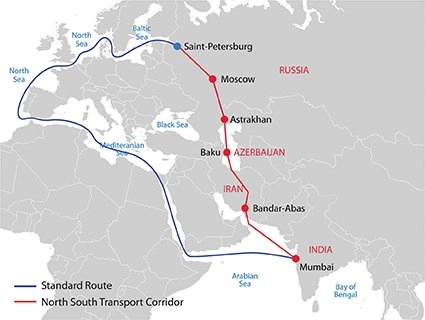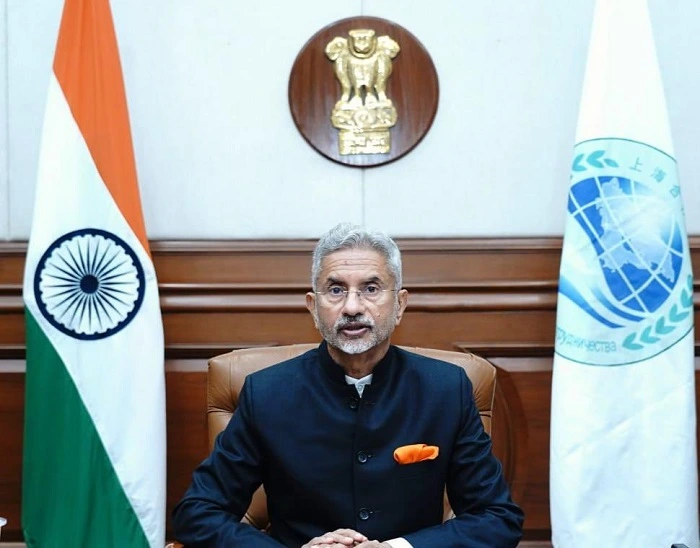India has reiterated the need for better connectivity in the Eurasian region which should be built on “centrality of interests” of Central Asian states.
At the same time, asserted External Affairs Minister S Jaishankar at a key Shanghai Cooperation Organisation (SCO) meeting held virtually on Tuesday, the connectivity projects should respect the sovereignty and territorial integrity of Member States and respect international law.
Representing India in the 21st Meeting of SCO Council of Heads of Government (CHG), Jaishankar also once again called for exploiting the full potential of Chabahar port – being developed by India in Iran – and the International North South Transport Corridor (INSTC) to unlock the economic capacity of the region.
Interestingly at the same meeting, other SCO member States – including Russia, Kazakhstan, Kyrgyzstan, Pakistan, Tajikistan and Uzbekistan – reaffirmed their support for China’s Belt and Road Initiative (BRI) initiative, including efforts to link the construction of the Eurasian Economic Union and BRI.
Prime Minister of Kazakhstan A A Smailov, Chinese Premier Li Keqiang, Tajikistan PM K Rasulzoda, Uzbekistan PM A N Aripov, Chairman of the Government of the Russian Federation M V Mishustin, Chairman of the Cabinet of Ministers of the Kyrgyz Republic A U Japarov and Pakistan’s Foreign Minister Bilawal Bhutto Zardari also participated in the meeting.

Besides the High representatives of the SCO Observer States, SCO Secretary-General Zhang Ming, Director of the SCO Regional Anti-Terrorist Structure Executive Committee R E Mirzaev, Chairman of the Board of the SCO Business Council D A Vakhabov, Chairman of the Council of the SCO Interbank Association A K Mirsoatov also attended the meeting.
In his address, Jaishankar also stated India’s strong cultural and historical connect with the SCO region and reiterated New Delhi’s firm commitment towards deepening multilateral cooperation in the areas of food and energy security, climate change, trade and culture.
“He spoke about the launch of the global Mission ‘LIFE’ (Lifestyle for Environment) by Prime Minister Modi on 20 October 2022, and its relevance to ensuring the food and energy security,” said a MEA statement.
The EAM drew attention to India’s commitment in fighting the challenge of climate change and also achievements made in this direction.
“He also emphasised India’s strong recovery on the economic front after the pandemic. EAM also expressed interest in expanding India-SCO trade on the basis of fair market access,” the statement added.
Represented India at the meeting of SCO Council of Heads of Government which has just concluded.
-Underlined that we need better connectivity in the SCO region built on centrality of interests of Central Asian states. pic.twitter.com/9EjQrekpaX
— Dr. S. Jaishankar (@DrSJaishankar) November 1, 2022
In a Joint Communique issued at the conclusion of the meeting, the heads of delegations agreed to further strengthen cooperation between the SCO Member States in tourism.
It mentioned their belief that the announcement of the ‘SCO Year of Tourism’ in 2023 and the city of Varanasi as the SCO tourist and cultural capital in 2022-2023 will assist in unlocking the potential of cooperation in the field of tourism in the region.
Last month, at the invitation of the President of Uzbekistan Shavkat Mirziyoyev, Prime Minister Narendra Modi visted Samarkand to participate in the 22nd meeting of the Council of the Heads of State of the SCO.
India also took over the rotational presidency of the regional multilateral organisation, that has eight member states, for the first time till September 2023.
Since joining SCO as a full member in 2017, India has been making positive contributions to the organistation processes, deliberations and its outcomes.
After the Council of Heads of State, the Council of Heads of Government is the second most important mechanism of the SCO, which deals principally with trade, economy and cultural agenda of the organisation.
Held annually, the SCO CHG meeting focuses on the trade and economic agenda of the organisation and approves its annual budget.
“Highlighted that in 2023, the UN International Year of Millets, India intends to foster greater cooperation with SCO Member States on countering the food crisis. Our total trade with SCO Members is only $141 billion, which has potential to increase manifold. Fair market access is to our mutual benefit & only way to move forward,” tweeted Jaishankar on Tuesday.
India chaired this mechanism during 2020 with the then Vice President Venkaiah Naidu presiding over our Summit meeting in November 2020 in virtual format.
During India’s chairmanship at that time, a number of initiatives were taken including holding an exhibition of shared Buddhist heritage in SCO member states in virtual format by the National Museum, translation of 10 books of regional Indian literature into the official languages of the SCO, i.e the Russian and the Chinese and hosting the first SCO Start up Forum, the first SCO MSME forum and the first SCO Young Scientist Conclave in virtual format.
The Regional Anti-Terrorist Structure, RATS of SCO is another important mechanism of the organisation. India assumed the chairship of the executive council of RATS in October last year for a year, and has been focusing on promoting practical cooperation in combating the problem of terrorism in the region.
Also Read: A connected Eurasia is closer to reality as India takes over SCO presidency




















